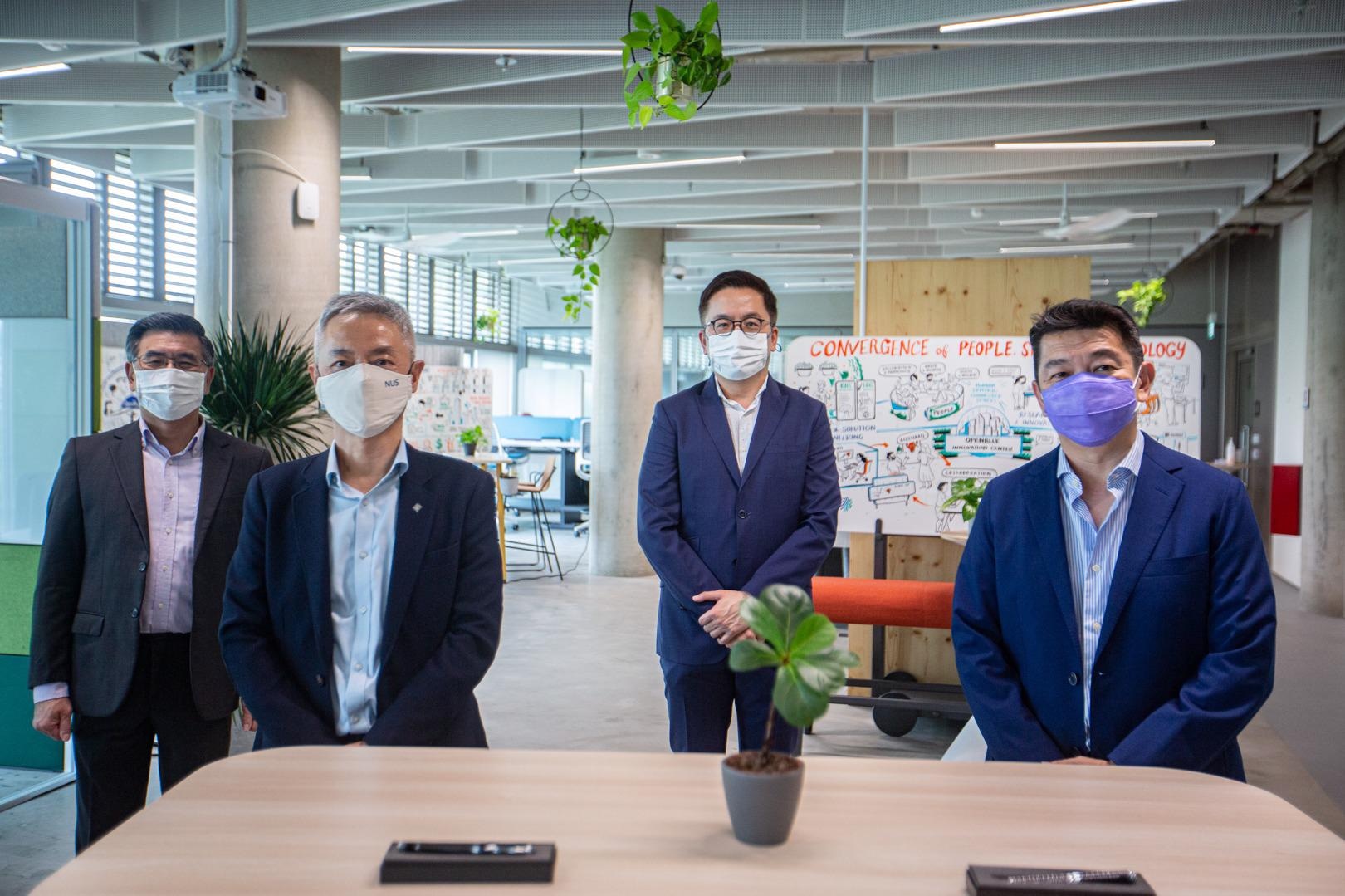Mar 17 2021
The National University of Singapore (NUS) together with Johnson Controls, the worldwide leader for healthy, smart and sustainable buildings, will initiate a joint collaboration on smart buildings research.
 National University of Singapore (NUS) and Johnson Controls signed S$5 million research agreement to co-create people-centric smart building systems. (From left) Prof Lam Khee Poh, Dean, NUS School of Design and Environment, Prof Yoon Soon Fatt, Director, Industry Engagements and Partnerships, NUS Office of the Deputy President (Research & Technology), Mr Kelvin Wong, CEO, Building and Construction Authority, and Mr Alvin Ng, Vice President, Digital Solutions, APAC, Johnson Controls were present at the signing ceremony on March 11th, 2021. Image Credit: National University of Singapore.
National University of Singapore (NUS) and Johnson Controls signed S$5 million research agreement to co-create people-centric smart building systems. (From left) Prof Lam Khee Poh, Dean, NUS School of Design and Environment, Prof Yoon Soon Fatt, Director, Industry Engagements and Partnerships, NUS Office of the Deputy President (Research & Technology), Mr Kelvin Wong, CEO, Building and Construction Authority, and Mr Alvin Ng, Vice President, Digital Solutions, APAC, Johnson Controls were present at the signing ceremony on March 11th, 2021. Image Credit: National University of Singapore.
Johnson Controls will contribute around S$5 million for this research program, and research groups from both organizations will join hands to deal with industry-wide challenges.
As Singapore advances its whole-of-nation movement on sustainable development, NUS is ready to seize the plethora of opportunities through our digital innovation activities and strategic collaborations with industry to drive the future of urban solutions.
Chen Tsuhan, Professor, Deputy President Research and Technology, National University of Singapore
“This collaboration between NUS and Johnson Controls will combine the University’s expertise in the science of cities and sustainability with Johnson Controls’ industry knowledge to co-create people-centric smart building systems to bring about impactful and radical changes to the lives of people in Singapore and the world,” added Tsuhan.
The NUS School of Design and Environment (SDE) will start the first research project in April 2021, which will be guided by Assistant Professor Clayton Miller from its Department of Building.
The study will involve the use of machine learning to expedite the transformation of Internet of Things (IoT) data into the BRICK Schema, a standardizing model for data labels in buildings.
This open-source schema illustrates smart buildings along with their subsystems in a format that allows software to more rapidly and easily link into a vast number of buildings.
The launch of a consistent schema for all buildings will better enable the industry to comprehend metadata usage across all kinds of buildings, to enhance total well-being for its users.
Our research collaboration with Johnson Controls will contribute to the built environment sector’s need for rapid digitalisation and enhanced collaboration across the entire industry value chain. The status quo is that each building speaks its own language when it comes to IoT.
Khee Poh, Professor and SDE Dean, National University of Singapore
“With this research, Asst Prof Miller’s team seeks to create a type of ‘translation engine’ to convert these individual languages into the BRICK schema. This is a critical piece of enabling technology for Singapore to develop future-ready solutions for sustainable cities in line with Singapore Green Plan 2030,” added Poh.
Since it is a laborious, time-consuming process to transform present meta-data schemas into the BRICK framework, the researchers plan to throw a machine learning competition to crowdsource solutions to determine the most precise technique for converting every building’s present labeling techniques into the BRICK schema.
The study will take advantage of the Johnson Controls OpenBlue Innovation Center housed at SDE, which was started in September 2020 as a testbed for a new range of contact-free, customizable applications developed on the Johnson Controls merging OpenBlue digital technology suite.
Mainly, its focus will be on the four SDE buildings, with the potential to extend the scope to include other buildings throughout the NUS campus.
“NUS is an important partner in our journey to transform the urban built environment, especially with the focus of ‘build back better’ in the recovery from the long pandemic,” stated Mr Alvin Ng, Vice President, Digital Solutions, Asia Pacific, Johnson Controls.
Tapping on the talents from both sides to research on artificial intelligence, sustainability as well as smart experience and wellness, we can innovate and scale from this NUS living laboratory. Singapore’s larger regulatory environment is also conducive for adoption of technologies to ensure our built environment is healthier and more sustainable.
Mr Alvin Ng, Vice President, Digital Solutions, Asia Pacific, Johnson Controls